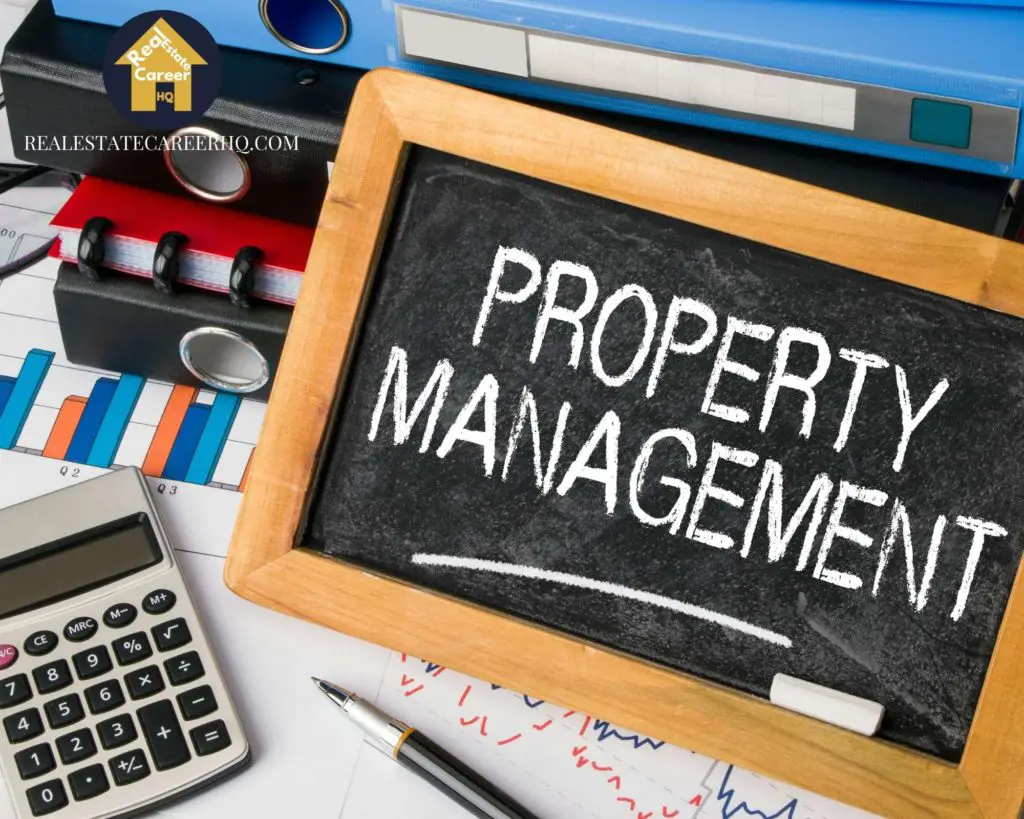(**) Disclosure: This post may contain affiliate links, meaning RealEstateCareerHQ.com will get a commission if you decide to make a purchase through the links, but at no additional cost to you.
Are you thinking of a career in the property management industry? If so, this is the perfect guide for you.
There is no license requirement to become a property manager in Maryland. Still, it is better to go through proper training and education, join an established property management firm, keep up with the updated real estate laws and join industry associations.
As a property manager, you are responsible for making sure the properties in your portfolio remain well maintained and that tenants have access to any resources they need. You may also be tasked with collecting rent, leasing new properties, and that the properties are up to code and safe for residents.
With so many different types of properties – from single-family homes to high-rises – there’s plenty of opportunities in Maryland! Many companies offer great benefits on top of competitive salaries to property managers.
In this guide, I will cover the steps to become a property manager in Maryland, income updates and other FAQs about this profession. So you may begin your career by joining a property management firm.
But before we start, I want to give a brief disclaimer. This post is not intended as legal advice or state/federal real estate training. It is for general information only. Please always follow your State laws and best practices.
5 Steps to Become a Property Manager in Maryland

Step 1: Get education on property management
Although there is no license required to become a property manager in Maryland, you could be feeling lost when starting in this field. One of the best to equip yourself to get the proper education from a trusted provider.
Here are the property management courses that may be helpful to you. They are offered by the Institute of Real Estate Management (IREM), an affiliate of the National Association of REALTORS®.
- Managing Residential Properties (**)
- Managing Commercial Properties (**)
- Managing Condominium and Homeowners Associations (**)
Step 2: Stay up-to-date with the real estate laws

Property managers are constantly tasked with new responsibilities and challenges. With the rise of online rental applications, environmental health and safety requirements, it’s important for property managers to be up-to-date on real estate laws and regulations.
For example, can you charge an application fee? Is it okay to run a background check on to prospective tenants? What happen if the tenants violate the lease agreement? Who will be responsible for the maintenance, repair or damages?
Here are some real estate laws and programs you should become familiar with:
| Code | Description |
| 8-203 | Security Deposits |
| 8-204 | Covenant of quiet enjoyment |
| 8-208 | Written leases |
| 8-208.1 | Retaliatory actions |
| 8-211 | Repair of dangerous defects; rent escrow |
| 8-212.1 | Liability of military personnel receiving certain orders |
| 8-401 | Maryland Real Property Section |
| 8-5A-02 | Termination of lease |
| Real Property, Title 8A | Mobile home parks |
| 12-203 | Minimum Livability Code |
| 20-702 | Fair Housing Laws |
Propertymanagement.com has an excellent resources page which covers the above in details. You can find their link in the reference section at the end of this post.
Step 3: Work with a reputable property management company

For many people, the first step in securing a job is to find an employer that they can trust. There are many property companies out there, but all are suitable for you. As you start in this industry, it will help if you work for a company that could provide you with proper training and mentorship. And you would likely start out working as an assistant to a property manager.
Rather than having you reinvent the wheels, an established property management company can show you a standard procedure in working with clients.
So take time and research the company before applying. Look at their reviews from customers and employees. You may start searching through job posting sites such as Indeed, ZipRecruiter, Glassdoor, or LinkedIn.
Step 4: Join industry associations
You may consider joining the National Association of Residential Property Managers (NARPM). This allows you to connect with other property managers, thus learn from their valuable experience and share ideas with one another. You will also find updates on the housing markets, changes to the laws and regulations.
Another group you may consider is the Maryland REALTORS. It consists of mostly real estate professionals. If you plan to run your own property management company, this can be a great referral source for your business. They also have great resources such as the classes, events, housing reports and industry updates.
Step 5: Start your own property management company

As you developed the necessary skillset, rather than working for someone else, you may consider starting a property management company. This allows you to hire other property managers, thus, lead to a scalable business model.
However, running a company is very different from working as an employed property manager. You need to figure out all the different aspects of the business, such as marketing, branding, prospecting, hiring, training, and accounting.
The expenses will also be a lot higher, you need to account for business insurance, staff’s salary and benefits, office rent, furniture, office supplies, software, many more.
Here’s a guide on how to start a property management company in Maryland.
Here’s a snippet of what a property manager thinks about this career

“I’ve been a property manager for six years, and for three years before that, I was an admin and then an assistant property manager. Being a property manager is an excellent career. The schedules are long days but flexible. If you are a parent, you will be able to attend your kid’s functions as long as you are willing to work late to make up. It’s not a micro-managed industry, so you must have the drive and high standards all on your own, else you won’t last very long. The mistakes are bigger and cost more money than other real estate lines, but the pay is great, and you can create the life balance you need if you work at it.
My advice to someone wanting to get into property management is to learn everything you can as soon as you can. Take advantage of resources and lean on experience people’s knowledge and experience.”
– Nandi Cavil, Commercial Property Manager at Cushman & Wakefield
Here’s another post where you can read more on Nandi’s thoughts about the property management profession. In there, you can find my research and analysis on this career path and valuable insights from other property managers.
How much do property manager make in Maryland?

Property managers in Maryland make an average annual income of $104,566. It typically range between $90,769 and $120,299. (*) Your earning as a property manager would depend on your skills, knowledge and experience in managing the properties. The type and number of real estate in your managing portfolio may also affect your compensation.
At the beginning phase of your property management career, you could be working as an assistant for a property manager. So your earning could be limited at that time.
But once you have developed the necessary skillset and demonstrated your ability to work independently, there should be a significant improvement to your earning.
(*) Source: Salary.com May 27, 2021
Here’s salary guide you may be interested. In there, you’ll find the income figures for residential and commercial property managers. What makes one earn more than others? How do education, experience, and certification play a factor in earning?
I have more questions about the Maryland real estate laws, whom should I contact?
You could contact the Maryland Real Estate Commission at:
- 500 North Calvert Street, 3rd Floor, Baltimore, MD 21202-3651
- Phone: 410-230-6230
- Fax: 410-333-0023
- e-mail: dlmrec-dllr@maryland.gov
Disclaimer: The information in this post is for general information only, and not intend to provide any advice. They are subjected to change without any notice, and not guaranteed to be error-free. Some of the posts on this site may contain views and opinions from individual not related to JCHQ Publishing. They do not necessarily reflect our view or position.
(**) Affiliate Disclosure: Please note that some of the links above are affiliate links, and at no additional cost to you. Our company, JCHQ Publishing will earn a commission if you decide to make a purchase after clicking on the link. Please understand that we include them based on our experience or the research on these companies or products, and we recommend them because they are helpful and useful, not because of the small commissions we make if you decide to buy something through the links. Please do not spend any money on these products unless you feel you need them or that they will help you achieve your goals.
Reference:

